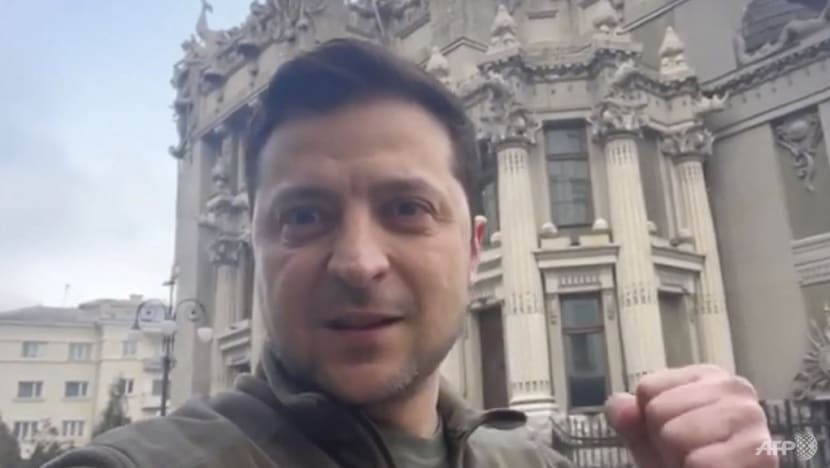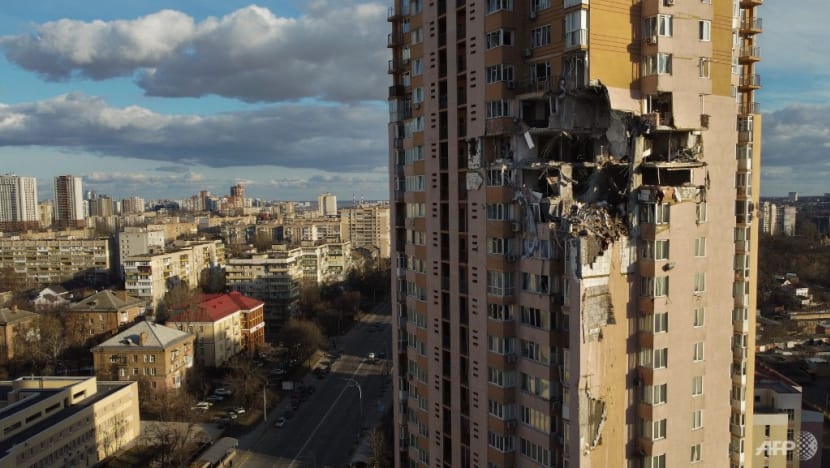Commentary: Why does Ukraine think it can beat Russia?
The incredible bravery of the Ukrainians led by President Volodymyr Zelenskyy is sparking a change in European security and a reflection on nationhood. But can they effect a global change of heart fast enough to save themselves?

This screengrab taken from a video made available on the Facebook account of the President of Ukraine Volodymyr Zelenskyy, shows himself speaking to the camera on Feb 26, 2022. (Photo: AFP/Facebook/Volodymyr Zelenskyy)
SINGAPORE: The disturbing developments in Ukraine this past week should make every Singaporean sit up.
They’re very relevant to Singapore, but not so much in the tired trope of needing to keep our guard up as a similarly small and vulnerable state in an uncertain world.
Ukraine has 44 million people and is the size of France. They have a strategic buffer and a fighting chance of beating back attackers, compared to city-state Singapore.
Yet, watching multiple videos of Ukraine President Volodymyr Zelenskyy walking out to his embattled city of Kyiv to declare that he’s staying the course to fight for his country and broadcasting so to encourage his fellowmen, I couldn’t help but wonder: Would I too find the courage to remain to fight for my country if the unthinkable happened?
Would I die for Singapore if it comes down to it?
“We are going to defend our nation … This is our language, our country, our children. And we will defend all this,” Zelenskyy said on Sunday (Feb 27) after he reportedly turned down a US offer to evacuate the country to become a de facto government-in-exile.
“We are all still here,” he said the night before, standing in the middle of Kyiv with his government leaders, a pillar of strength amid the flood of cars rushing to depart the city.
His conviction is startling. For an idealist who believed in Ukraine joining the world’s biggest military alliance, the North Atlantic Treaty Organization (NATO), and the promise of a brighter future with a European Union (EU), the invasion should have crushed him.
Zelenskyy himself had downplayed the threat of a Russian incursion and dismissed warnings mere days before the assault. He had been seen as soft in managing the Ukraine-Russia relationship. He gravely miscalculated.
His world should have collapsed, so why was he still there? What did he have left to fight for?
WHY DIDN’T ZELENSKYY FLEE?
It would have been painful to see but understandable if Zelenskyy had chosen to leave the country. Fleeing heads of state are not uncommon: President Ashaf Ghani deserted his Afghanistan homeland as soon as the Taliban began their attacks.
And after all, Zelenskyy had been abandoned. The post-World War II global order, premised on the inalienable right of independent countries to security of their borders and respect for their sovereignty, enshrined in the 1945 United Nations Charter, should have sent countries doing all they can to stop this travesty of justice.
Yet, the initial response of economic sanctions from NATO countries was pathetic. The international condemnation should have been deafening when Russia flagrantly sent troops in, just as the United Nations Security Council was deliberating on next steps. And when US President Joe Biden already warned last week of an impending invasion, some strong drawer plans should have been in place.
These token moves can feel more like a response of form more than substance. Sanctions also depend on the passage of time for effects to be felt, for people in Russian to hurt and move to demand their government halt the military offensive, at a time when Russian tanks and artillery are already rolling into Ukraine.
Western countries may have begun to send ammunition, anti-aircraft weapons systems and more in recent days. But that feels like cold comfort when boots on the ground and soldiers in the streets are now what’s needed to hold lands and repel enemy forces.
The urgency over which an international response is needed to roll back Russian units cannot be greater. Russian forces are still shelling the capital. This is war with no casus belli.
As Russia continues to bombard Ukrainian cities, their proposal for negotiations is looking like a tactic to distract the Ukrainians while the other side resupplies, redeploys and prepares to unleash a calamitous full-scale invasion to force Ukraine to its knees.
DESPITE ODDS, UKRAINE IS SPARKING A CHANGE OF HEART
The odds continue to be stacked against Ukraine and Zelenskyy has little reason for optimism. Yet there he is night after night. Russia’s “number one target” has transformed into the wartime president Ukraine desperately needs in this hour of darkness.
He’s even magnificently galvanised the global community behind him. From Paris to New York and Bangkok, people have besieged Russian embassies to shake their fists and press their governments to help halt this horrific assault.
All those worries at the individual level - of inflation, cost of living and COVID-19 - look petty compared to the snuffing out of a nation. Budget and the GST hike have scarcely gotten discussion.
On a broader level, Zelenskyy is provoking a rethinking of many European sacred cows - on security and immigration at least. Germany’s new chancellor Olaf Schloz just made an unimaginable shift in defence spending and channeled US$100 billion to these ends. The European Union is opening its doors to potentially 1 million Ukrainian refugees.
BUT ITS RESOLVE WILL BE TESTED IN THE DAYS TO COME
Despite these encouraging moves, Ukraine’s resolve will continue to be tested as stamina and focus may determine its fate more than political grandstanding and posturing.
The ingenuity of the Ukrainians and their unconventional ground-up warfare - in removing road signs to confuse their occupiers, recruiting hackers to rain chaos on Russia and much more - have played a part in thwarting Russian plans thus far. But all Russia has to do is to deploy more of their 900,000-strong active military personnel.
Ukraine isn’t invincible. We should be careful not to confuse a few high-profile, meme-worthy publicity stunts that admirably maintains the media spotlight on Ukraine for the painful but effective means needed to compel a withdrawal.
There are some hard questions at the heart of this matter. Boris Johnson will talk a good game to get out of the Party-gate doghouse but with Vladimir Putin’s gamble on heightening the alert levels of nuclear forces, is London or Washington willing to die for Kyiv?
Even if we take the nuclear deterrent out of the picture, a slow-boil conflict with Russian forces remaining in Ukraine will swallow Ukraine whole. Can Europe find the collective political will to roll back the Russian presence when Ukraine begins to be drowned out by a 24/7 news cycle?
The coming days will be crucial. If Russia calibrates its actions to turn the situation into a low-intensity conflict, international attention on the issue will vanish and with it, Europe’s political, economic and any military support.

WHEN NATIONHOOD IS TESTED, WE WILL PROBABLY GO DOWN SWINGING THE WAY UKRAINIANS ARE
All of us stone-cold, stiff-hearted realists know that international law only works if everyone plays by the rules.
We have no illusions how power and military might can be the main currency in geopolitics. But to bear witness to a country coming under attack and those with the means to stop that looking the other way is a horrible cruelty to stomach.
If the point was to prove US President Biden’s concert of democracies to be a paper tiger, Russia might win. All it takes is for good men to do nothing.
In the final analysis, Ukraine maybe does underscore how little any country can depend on external help even in the most unjust of situations. Perhaps the continued assault is also an uncomfortable but necessary reminder that Crimea’s annexation in 2014, which was starting to recede into memory, needs urgent review.
What’s really turned the tide here are the Ukrainians deciding themselves to stand their ground. Seeing visuals of the elderly, women and children packed off to neighbouring safe havens while the men arm themselves has been sobering.
All it took was the determination of one man to inspire millions.
Ukraine is determined to write its future, that much is clear. Zelenskyy is giving it all he’s got to press the point - applying for EU membership and making an emotional appeal to the European Parliament.
Nationhood can be something we take for granted. It can mean many things to many people. But when the button is pressed, that’s when its value is tested.
Here in Singapore, I asked myself again, would I die for my country? And if I were a man of eligible age, would I answer the call of mobilisation?
Or will we be like those draft dodgers who fled their duties and ditched Ukraine at the first sight of trouble?
The answer must be to stay and fight. Zelenskyy has made any other option unconscionable. And conversations on Ukraine I’ve had with family and friends suggest that every man and woman I know would rather go down swinging than jet away to some other place that isn’t home.
Like Foreign Minister Vivian Balakrishnan said on Monday, Singapore is following the crisis with grave concern.
I will add that we do this with broken hearts and a profound reflection on what nationhood means to us.
Lin Suling is supervising editor at CNA Digital where she oversees the Commentary section and hosts CNA's Heart of the Matter podcast.


















